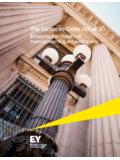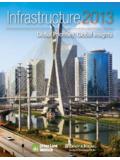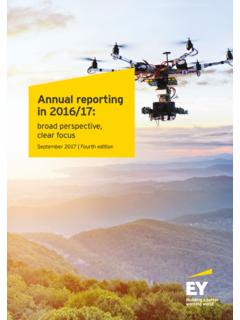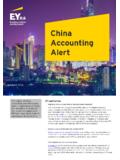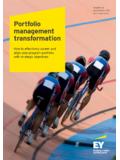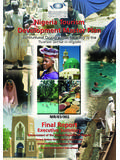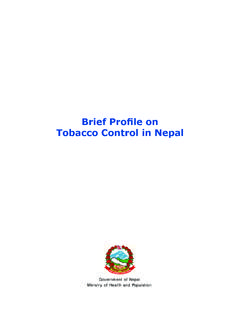Transcription of Tax update - Income Tax (Amendment) Bill 2017
1 Executive summary The Income Tax ( amendment ) bill 2017 ( bill ) was introduced in Parliament on 11 September 2017. The bill seeks to give legislative effect to the Budget 2017 tax changes as well as various non-Budget tax changes. A public consultation exercise was conducted by the Ministry of Finance (MOF) on the draft bill from 19 June to 10 July 2017, and the bill that was introduced in Parliament incorporates the feedback given by the public, which was accepted by the MOF. This alert provides a summary of a selection of some of the key tax changes1. 1 Please refer to a separate EY alert on the Transfer Pricing - related changes introduced in the bill . 20 September 2017 Income Tax ( amendment ) bill 2017 Tax update Discussion The key tax changes include the following: Expenditure on research and development under a Cost Sharing Agreement2 To ease compliance, it was proposed in Budget 2017 that taxpayers may opt to claim tax deduction under Section 14D of the Income Tax Act (ITA) for 75% of the payments made under a Cost Sharing Agreement (CSA) incurred for qualifying research and development (R&D) projects, in lieu of providing a breakdown of the expenditure covered by the CSA payments to strip out non-allowable expenditures.
2 It was proposed that the change would apply to the CSA payments made on or after 21 February 2017. As a result of feedback from the public after the Budget announcement, the MOF decided to liberalise the treatment of CSA payments instead. The bill provides that a full deduction will be allowed from year of assessment (YA) 2018 under Section 14 D(1)(g) and Section 15(2C) in respect of the CSA payments, without the need to look beyond the payments to determine if there are any non-allowable expenditures. The bill provides that R&D activities need not be related to the taxpayer s trade or business, and the R&D activities need not be undertaken in Singapore even if the R&D is not related to the taxpayer s trade or business. The bill also clarifies that a payment made by a person under a CSA refers to the expenditure that is allocated to the person for the person to bear under the CSA. In addition, the time the CSA payment is made is when the expenditure becomes payable; if no payment is needed, then it would be the time of allocation.
3 Additional and enhanced deduction for qualifying R&D expenditure under a CSA With effect from YA 2018 to YA 2025, additional (50%) deduction will be given on qualifying costs incurred by the taxpayer on undertaking Singapore R&D under a CSA (whether by himself or on his behalf by an R&D organisation), subject to new capping conditions. Further, the enhanced (300%) deduction for qualifying payments under a CSA for foreign R&D or for that part of the R&D undertaken in a foreign country, is subject to additional capping criteria3. This is applicable only for YA 2018 as the Productivity and Innovation Credit scheme will expire after YA 2018. 2 See EY Tax update Liberalisation of tax deduction for payments under Cost Sharing Agreements dated 23 June 2017. Adjustment on change of basis of computing profits of financial instruments resulting from FRS 109 FRS 109 Financial Instruments will replace the FRS 39 - Financial Instruments: Recognition and Measurement and is applicable to entities for financial periods beginning on or after 1 January 2018.
4 Early adoption is permissible. A new section provides for the tax treatment of gains or losses in respect of financial instruments recognised under FRS 109 by a qualifying person. Consistent with the FRS 39 tax treatment, the FRS 109 tax treatment is aligned with accounting unless exceptions apply, for example, items of a capital nature, and expected credit losses of a financial instrument that is not credit-impaired. The FRS 109 tax treatment is applicable to all qualifying persons and there is no opt-out provision, unlike in the case of FRS 39 tax treatment. The bill provides that the Comptroller of Income Tax (CIT) will be allowed to subject to tax, a gain recognised under FRS 109 that was treated as capital in nature and later discovered to be revenue in nature, or a loss or expense relating to a financial instrument and recognised under FRS 109 that was allowed as a deduction because it was treated as revenue in nature and later discovered to be capital in nature.
5 Conversely, a deduction will be allowed where a gain recognised under FRS 109 was treated as revenue in nature and later discovered to be capital in nature, or a loss or expense relating to a financial instrument and recognised under FRS 109 was not allowed as a deduction because it was treated as capital in nature and later discovered to be revenue in nature. However, no assessment of the Income or a claim for a deduction may be made after a period of four years after the end of the YA of the basis period in which the instrument is disposed of. This provision is incorporated to address any unrealised gains, losses or expenses that may be recognised under FRS 109 before their true nature becomes known. 3 Other than the Productivity and Innovation Credit scheme expenditure cap. Adjustments arising from adoption of FRS 1154 FRS 115 Revenue from Contracts with Customers applies to entities for their annual periods beginning on or after 1 January 2018 if there is no early adoption.
6 A new section sets out the tax treatment of any transitional gain or loss recognised upon adoption of FRS 115 by a person (which includes a partnership). This will apply to the basis period of the first YA when FRS 115 is first adopted (initial YA). Any transitional gain or loss will be taxed or allowed a deduction based on the tax rate(s) applicable to the person for the initial YA. A formula is required to be applied to the transitional gain or loss to determine the tax rates applicable, based on specified Income subject to tax and specified Income exempt from tax (if applicable) of the person for the initial YA. Tax treatment for foreign companies redomiciled in Singapore5 A tax treatment has been proposed for a foreign company redomiciled in Singapore, provided it had never carried out any trade or business in Singapore at any time before the date of redomiciliation (called the registration date). The bill deals with, amongst others, the tax treatment of any bad or impaired debts of the company incurred in any trade or business before its registration date, the value to be used for deduction of any trading stock acquired before registration date, and claiming of capital allowances on transferred-in plant and machinery as well as transferred-in intellectual property rights used for purposes of the trade or business in Singapore.
7 The bill also deals with tax credits, which would be available if the company s place of incorporation levies on the company an exit tax of a similar character to Income tax on its unrealised profits that are also taxed in Singapore. The amendment will take effect from the date the Income Tax ( amendment ) Act is published in the Gazette. 4 See EY Tax update Adjustments arising from adoption of FRS 115 issued in July 2017. 5 See EY Tax update Inward redomiciliation regime in Singapore dated 24 July 2017. Multilateral Instrument6 Amendments will be made to Section 49 (Avoidance of double taxation arrangements) to enable Singapore to implement its obligations under the Multilateral Convention to Implement Tax Treaty Related Measures to Prevent Base Erosion and Profit Shifting (BEPS), also known as the Multilateral Instrument, which Singapore signed on 7 June 2017. The amendment will take effect from the date the Income Tax ( amendment ) Act is published in the Gazette.
8 Clarification of the definition of ship management services under Maritime Sector Incentive (MSI) The bill seeks to clarify the scope of ship management services that qualify for tax exemption for the period from 22 February 2010 to 23 February 2015 under the MSI Singapore Registry of Ships and the MSI - Approved International Shipping Enterprise awards, and for the purpose of definition of ship management services under the MSI-Shipping Related Support Services: Awarding contracts, entering into alliances, or deciding on pooling, in respect of it Planning its route and tonnage, including the issuance of voyage instructions Appointing a ship manager, ship agent or stevedore for it Collecting or arranging for the collection of freight, charter hire, or other payment in exchange for its use Undertaking crew-related matters for it, including the provision of qualified crew, the appointment of a crew manager, the provision of crew training or the arrangement of crew insurance Arranging or supervising dry-docking, repair, overhaul, alteration, maintenance or lay-up of it Ensuring that it is adequately equipped with supplies, provisions, spares, stores and lubricating oil Liaising with the relevant competent authorities or bodies on safety and manning requirements for it and any other similar matters The amendment will have retrospective effect from 22 February 2010.
9 6 See EY Tax Alert Singapore signs the BEPS Multilateral Instrument issued in June 2017. Refinement of the Maritime Sector Incentive Shipping related Support Services (MSI-SSS) scheme The following corporate services provided by the MSI-SSS recipients to its approved related company will be excluded under the scheme: Marketing control, planning and brand management services (under the corporate service definition) Research and development (including test bedding) services carried out on behalf of the approved related company Intellectual property management services (under the corporate service definition) The above amendment will take effect for Income derived on or after the date the Income Tax ( amendment ) Act is published in the Gazette. In addition, it is clarified that Information Technology (IT) services under the definition of corporate services, refers to IT support services. This amendment will have retrospective effect for Income derived on or after 2 June 2011.
10 Enhancement of the Global Trader Programme (GTP) The GTP has been enhanced such that a company carrying on the following businesses may, subject to conditions, be approved under the scheme: International trading in commodities derivatives Brokering international trades in commodities Currently, businesses conducting the above activities may be approved under the GTP only if they are also in the business of physical trading. The amendment will take effect from the date the Income Tax ( amendment ) Act is published in the Gazette. Extension and refinement of the Aircraft Leasing Scheme (ALS) The bill seeks to give legislative effect to the Budget 2017 proposal to extend and refine the ALS as follows: To extend till 31 December 2022 the period in which a company may be approved for the ALS To streamline the concessionary tax rates on Income derived from the leasing of aircraft or aircraft engines and the conducting of qualifying ancillary activities from 5% and 10% to a single rate of 8% for new or renewed incentive awards approved on or after 1 April 2017 Real Estate Investment Trust (REIT) The concessionary Income tax rate of 10% on distributions made by the trustee of a REIT to qualifying non-resident non-individual investors of listed REITs has been extended till 31 March 2020.
